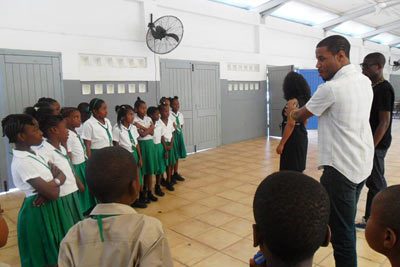Overseas service 'life-changing' for Africana-sociology double major
By Linda B. Glaser

Six months after the January 2010 earthquake hit Haiti, Dean Oliver '12 was on his way to the island using funds he'd raised from Cornell friends in a mere two weeks.
Being in Haiti "was a life-changing, eye-opening experience," says Oliver, who has a passion for justice. He spent most of his time in a rural village 12 miles north of Port-au-Prince, helping build a health clinic, laying the foundation of a bridge and delivering hygiene kits. "And I did a lot of plumbing," he adds with a laugh.
In the midst of the devastation, Oliver felt challenged by how a privileged Ivy Leaguer like himself could communicate his compassion to the Haitians, who he found a surprisingly joyful people. His response, he says, was to do a lot of praying.
Oliver says that "my Cornell experience challenged me to serve and sacrifice and that mission has taken me all over the world." An interest in apartheid history and its parallels with black experiences in the Americas helped inspire Oliver's next trip, to South Africa. "As an Africana major and a black person, going to Africa is pretty big," he explained.
N'Dri Assie-Lumumba, Africana professor and one of Oliver's advisers, provided invaluable help as he planned his trip. She even arranged for him to stay with friends, giving Oliver the opportunity to get to know South Africans his own age.
Oliver did numerous small volunteer projects in different parts of the country, such as helping to develop a rural township through Habitat with Humanity, tutoring high school students and running a sports clinic in an unusually integrated rural primary school. "South Africa is still very segregated," he explains. "It's getting better, but it has a lot of lingering issues because of apartheid."
An externship with the Johannesburg Development Agency inspired his senior thesis. The agency is working to revitalize the city and make it more cosmopolitan. Their initiatives include a new bus system, which Oliver, who double majors in sociology, says will help to reduce the way distance from the city exacerbates rural poverty.
Oliver's senior thesis examines social networks in Johannesburg and suggests ways to help move the city from its current fragmentation to a more cohesive centralization. He plans to share his completed thesis with the people he worked with in Johannesburg.
Oliver's most recent service trip was with a student-run organization called "Jamaica Difference," dedicated to service learning in Jamaica. The group conducted motivational workshops at an elementary school in Kingston. Both Oliver's parents are from Jamaica, and he found being immersed in the island's culture "almost like a homecoming." Oliver's parents have been strong backers of his learning, but with three children simultaneously in private universities, the financial aid Oliver received from Cornell was crucial. "I wouldn't be here otherwise," he says.
Cornell, too, has benefited from Oliver's commitment to social justice. He has been a resident adviser in Ujamaa Residential College; served on the student-run Men of Color Council, working on ways to improve graduation and retention rates for black and Latino students; and chaired the Executive Committee for the Festival of Black Gospel, a three-day event that he worked hard on to ensure free admission for all. "The festival was a very cool experiment for me in social entrepreneurship," he says.
After graduation, Oliver will look for the kind of job that he did overseas and at Cornell: "Work," he says, "that's socially productive and empowers people."
Linda B. Glaser is staff writer for the College of Arts and Sciences.
Media Contact
Get Cornell news delivered right to your inbox.
Subscribe